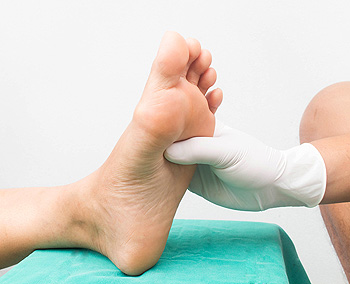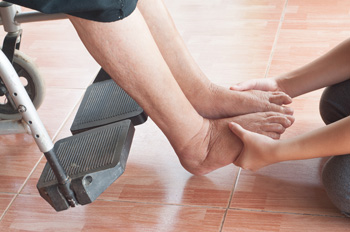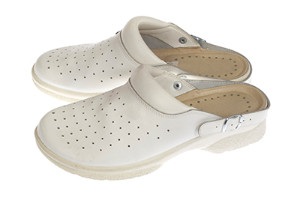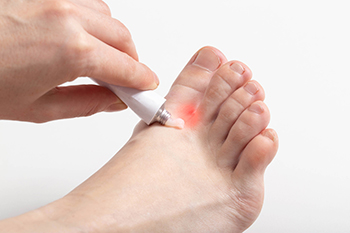Items filtered by date: August 2024
What Is Peripheral Neuropathy?

The brain and spinal cord make up the central nervous system, which, under normal circumstances, communicates with other parts of the body through the peripheral nervous system. When nerves within the peripheral nervous system become damaged and interrupt the complex messaging system with the central nervous system, this is known as peripheral neuropathy. Peripheral neuropathy can be caused by diabetes, injury, or autoimmune diseases. Sometimes vascular issues, infections, and certain medications can also cause peripheral neuropathy. This condition can cause stabbing or shooting pain, numbness, cramping, or burning in the feet. It can also result in extreme sensitivity to touch, lack of coordination, or clumsiness. If you are experiencing any of these symptoms, it is suggested that you schedule an appointment with a podiatrist who is adept at diagnosing and managing peripheral neuropathy in the lower extremities.
Neuropathy
Neuropathy can be a potentially serious condition, especially if it is left undiagnosed. If you have any concerns that you may be experiencing nerve loss in your feet, consult with Dr. Paul Drucker from NYC Foot Care, PC. Our doctor will assess your condition and provide you with quality foot and ankle treatment for neuropathy.
What Is Neuropathy?
Neuropathy is a condition that leads to damage to the nerves in the body. Peripheral neuropathy, or neuropathy that affects your peripheral nervous system, usually occurs in the feet. Neuropathy can be triggered by a number of different causes. Such causes include diabetes, infections, cancers, disorders, and toxic substances.
Symptoms of Neuropathy Include:
- Numbness
- Sensation loss
- Prickling and tingling sensations
- Throbbing, freezing, burning pains
- Muscle weakness
Those with diabetes are at serious risk due to being unable to feel an ulcer on their feet. Diabetics usually also suffer from poor blood circulation. This can lead to the wound not healing, infections occurring, and the limb may have to be amputated.
Treatment
To treat neuropathy in the foot, podiatrists will first diagnose the cause of the neuropathy. Figuring out the underlying cause of the neuropathy will allow the podiatrist to prescribe the best treatment, whether it be caused by diabetes, toxic substance exposure, infection, etc. If the nerve has not died, then it’s possible that sensation may be able to return to the foot.
Pain medication may be issued for pain. Electrical nerve stimulation can be used to stimulate nerves. If the neuropathy is caused from pressure on the nerves, then surgery may be necessary.
If you have any questions, please feel free to contact our offices located in 70th Street Manhattan, 60th Street Manhattan, Jamaica, Queens, Plainview, NY and Fair Lawn, NJ . We offer the newest diagnostic and treatment technologies for all your foot care needs.
Foot Issues in the Elderly

Foot issues in older adults are often linked to frailty and decreased motor performance, significantly impacting their quality of life. Common problems include arthritis, bunions, calluses, and reduced foot flexibility, leading to pain and difficulty walking. These issues can increase the fear of falling, contributing to reduced mobility and independence. A podiatrist can perform a gait analysis and balance assessment to identify specific problems. Customized orthotics, proper footwear recommendations, and targeted exercises can improve stability and alleviate pain. If you are elderly or taking care of an older person, it is suggested that you schedule regular podiatric visits to help maintain foot health, enhance mobility, and reduce the risk of falls.
If you need your feet checked, contact Dr. Paul Drucker of NYC Foot Care, PC. Our doctor will attend to all of your foot and ankle needs and provide you with quality treatment.
Geriatrics and Podiatry
When people age, some common issues that may occur are bone density loss, dry skin, poor circulation, and rough brittle nails. These issues may also affect your foot health if the necessary steps are not taken to alleviate the problems.
It is important to take care of your feet because feet that are injured or diseased can affect your overall health. Having painful feet hinders your ability to do daily activities or may decrease your willingness to do the things that you need to do.
Visiting Your Geriatrician
As we age, health problems become more likely, so it is essential to visit your doctor for check-ups to ensure that you are doing the best you can to take care of your health. It is recommended to check your feet frequently for any possible cuts, bruises, swelling, corns or any other irregularities.
Taking Care of Elderly Feet
Cracked or dry feet can be treated by applying moisturizer often. It is also important not to wear old socks because the older the sock is, the higher the possibility there will be that there is bacteria there. Wear fresh socks and make sure they fit properly.
Proper foot health means that you can have a more active lifestyle and you will not be bogged down by pain. Foot health also leads to good circulation, which is paramount for overall health.
If you have any questions, please feel free to contact our offices located in 70th Street Manhattan, 60th Street Manhattan, Jamaica, Queens, Plainview, NY and Fair Lawn, NJ . We offer the newest diagnostic and treatment technologies for all your foot care needs.
Key Considerations in Choosing Shoes for Restaurant Employees

Selecting the right shoes for restaurant work involves focusing on durability, ease of cleaning, and proper fit. Durability is essential as restaurant workers face demanding conditions, requiring shoes that can withstand frequent use and exposure to spills and stains. Opt for materials that are resilient and capable of enduring the rigors of a busy kitchen. Ease of cleaning is also important, as shoes should be easy to wipe down or wash to maintain hygiene and appearance. Proper fit cannot be overstated, and shoes should offer ample support and cushioning to prevent discomfort and foot fatigue during long shifts. A well-fitted shoe reduces the risk of foot injuries and enhances overall job performance. If you have injured your foot while working, it is suggested that you contact a podiatrist who can offer appropriate treatment options.
While working on the feet, it is important to take the proper care of them. For more information about working on your feet, contact Dr. Paul Drucker from NYC Foot Care, PC. Our doctor will treat your foot and ankle needs.
Working on Your Feet
Standing on your feet for long periods of time can cause stress and pain in your feet. Your whole body may experience change in terms of posture, back pain, bunions, callouses and or plantar warts. There are ways to avoid these conditions with proper foot care, smart choices and correct posture.
Positive Changes
Negative heeled shoe – Choosing this shoe type places the heel slightly lower than the ball of the foot. These are great for overall foot health. Find shoes that fit you correctly.
Go barefoot – Our feet were not designed to be enclosed for all hours of the day. Try to periodically expose your feet to air.
Eliminate Pain
Foot Exercises – Performing simple exercises, incorporating yoga and doing stretches are beneficial. This will allow increased blood flow to the area and muscles of the foot.
Achilles tendon – Stretching the foot out flat on the floor will relax the calf muscles and tendon. These exercises can be performed almost anywhere. Make sure you add these exercises to your daily regimen.
With a little bit of this information and knowing more about foot health, you will notice changes. Foot stretches and proper footwear will help with pain and prevent further issues.
If you have any questions please feel free to contact our offices located in 70th Street Manhattan, 60th Street Manhattan, Jamaica, Queens, Plainview, NY and Fair Lawn, NJ . We offer the newest diagnostic and treatment technologies for all your foot and ankle needs.
Treating Athlete’s Foot
 Athlete's foot, or tinea pedis, is a common fungal infection that affects the skin of the feet. It is caused by dermatophytes, fungi thriving in warm, moist environments like shoes, locker rooms, and swimming pools. Symptoms can include itching, stinging, and burning between the toes or on the soles, in addition to blisters, cracking, peeling, and dry skin. Risk factors include walking barefoot in communal areas, sharing footwear, having sweaty feet, and wearing tight-fitting shoes. People with weakened immune systems or diabetes are particularly susceptible. Treatment involves antifungal medications, available as creams, sprays, powders, or oral medications. Keeping feet clean and dry, changing socks regularly, and using antifungal powders can prevent recurrence. Complications can arise if left untreated, such as secondary bacterial infections, spreading to other body parts, and chronic infection. If you have a severe case of athlete’s foot, it is suggested that you visit a podiatrist for more aggressive treatment and medical supervision.
Athlete's foot, or tinea pedis, is a common fungal infection that affects the skin of the feet. It is caused by dermatophytes, fungi thriving in warm, moist environments like shoes, locker rooms, and swimming pools. Symptoms can include itching, stinging, and burning between the toes or on the soles, in addition to blisters, cracking, peeling, and dry skin. Risk factors include walking barefoot in communal areas, sharing footwear, having sweaty feet, and wearing tight-fitting shoes. People with weakened immune systems or diabetes are particularly susceptible. Treatment involves antifungal medications, available as creams, sprays, powders, or oral medications. Keeping feet clean and dry, changing socks regularly, and using antifungal powders can prevent recurrence. Complications can arise if left untreated, such as secondary bacterial infections, spreading to other body parts, and chronic infection. If you have a severe case of athlete’s foot, it is suggested that you visit a podiatrist for more aggressive treatment and medical supervision.
Athlete’s foot is an inconvenient condition that can be easily reduced with the proper treatment. If you have any concerns about your feet and ankles, contact Dr. Paul Drucker from NYC Foot Care, PC. Our doctor will treat your foot and ankle needs.
Athlete’s Foot: The Sole Story
Athlete's foot, also known as tinea pedis, can be an extremely contagious foot infection. It is commonly contracted in public changing areas and bathrooms, dormitory style living quarters, around locker rooms and public swimming pools, or anywhere your feet often come into contact with other people.
Solutions to Combat Athlete’s Foot
- Hydrate your feet by using lotion
- Exfoliate
- Buff off nails
- Use of anti-fungal products
- Examine your feet and visit your doctor if any suspicious blisters or cuts develop
Athlete’s foot can cause many irritating symptoms such as dry and flaking skin, itching, and redness. Some more severe symptoms can include bleeding and cracked skin, intense itching and burning, and even pain when walking. In the worst cases, Athlete’s foot can cause blistering as well. Speak to your podiatrist for a better understanding of the different causes of Athlete’s foot, as well as help in determining which treatment options are best for you.
If you have any questions please feel free to contact our offices located in 70th Street Manhattan, 60th Street Manhattan, Jamaica, Queens, Plainview, NY and Fair Lawn, NJ . We offer the newest diagnostic and treatment technologies for all your foot and ankle needs.

